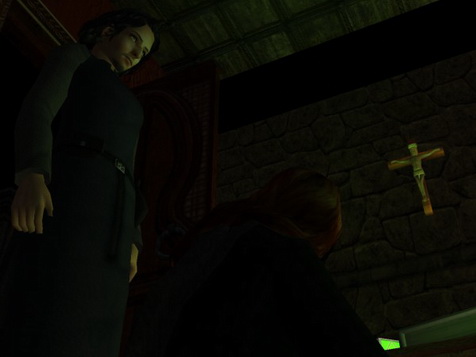
Araphel had to lean against the door merely to open it: some disobliging weight had to be slid away across the floor.
He saw it must have been books. There were books all over the floor, pens and ink and parchment, and a few dripping candles to augment the failing light of the winter afternoon. And in the center of it all sat the Abbot, huddled over like a roadside beggar.
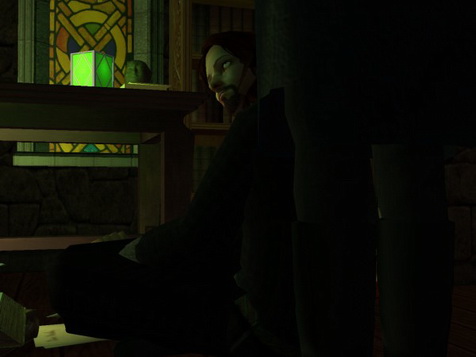
Sebastien’s peevishness was a convenient mask for Araphel’s alarm. “You are wanting to see me, Father?” he snapped. “I hope I at least may be permitted to sit in a chair?”
Amongst the other books and leaves, the Abbot had taken out all the lamb-white sheets of the manuscript they had been writing together – little though he had thought Aelfden had realized it – and with red ink had crossed out entire passages on many of the scattered pages, as if he had wanted to efface everything Sebastien’s conundrums and criticisms had caused him to add.
But Araphel’s true fright did not strike him until he had closed the door and seen what had been hiding behind it.
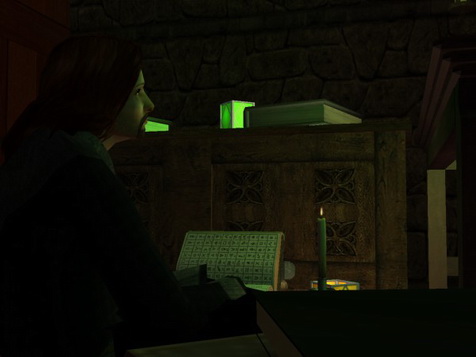
“What is that book?” he gasped.
“Ah! Know it, do you?” the Abbot cried, harshly triumphant.
Araphel did not know the book, but the letters leapt up at him like the last sparks from a fire long since burnt to ash.
He had never forgotten his first winter, over three thousand years before, and their camp fires that had seemed tiny sparks in the midst of those long, dark nights. He still remembered how good that first experience of warmth had felt to his new skin, and how he had savored the smoke with his new nose, and the men’s food with his new tongue, and his new wife with his new body – more clearly than ever now that Flann and their exquisite daughter had permitted him to feel something like that newness again.
As honored guests, he and his brothers had the warmest places before the fire, but he remembered the night all of the men had squatted close by or stood behind them, leaning low on their nomad’s staffs as Ramiel scratched those first symbols into the fine, frosty dust of the plain.
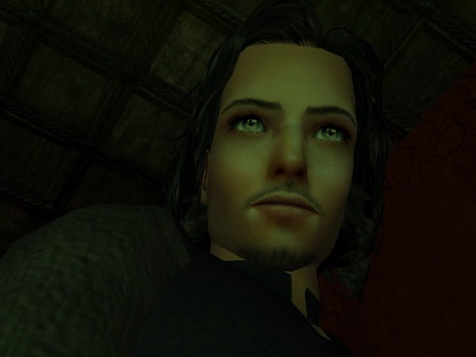
His brother had made them up as he went, choosing images those cattle-herding men would know – an ox head, a tent-pole, a rope, a foot – but together they could be used to write the tale of anything, liberating the men to dream of more than tents and cattle – turning their feet onto the road of civilization, with all its ugliness.
Sometimes when he wrote the letter “A”, Araphel would wonder at these unseeing men who stubbornly drew the ox head upside-down. Like the men themselves and their Babel of modern languages, modern letters were but imperfect copies of imperfect copies of the beauty that had gone before.
But here on the floor were catalogued all of those first symbols, as clear and expressive as Ramiel’s dust-drawn alphabet of three thousand years ago, even to the jaunty right-side-up ox head with its curving horns.
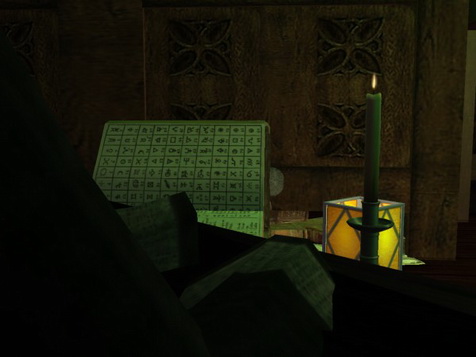
It was merely a list of letters and meant nothing in itself, but it was the only earthly alphabet capable of perfectly expressing the language of angels. Fortunately the following page appeared only to contain a lot of Greek and some meaningless diagrams, but the alphabet alone had been enough to make Sebastien’s sickly heart pound.
“I never saw this book in my life,” Araphel protested breathlessly. “If I did, I would not ask you what it is, would I?”
They were Sebastien’s sort of words, but even Sebastien was too unnerved to speak with Sebastien’s snappish tone of voice.
Aelfden growled, “It is a book for summoning demons.” He smacked the flat of his hand down on the Greek text. “And it seems to have worked! Perhaps I got tired of waiting for you, and summoned you here!”
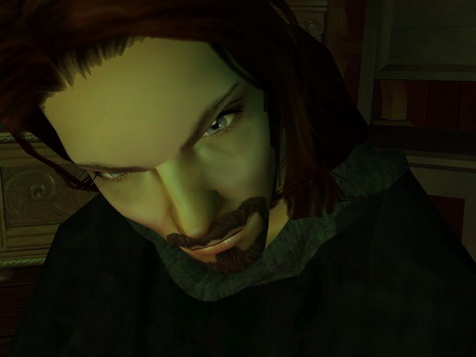
It was not Aelfden’s tone of voice either – it was strident and savage, and his eyes were wild. A sheen of wetness seemed to have settled over his entire figure: his hair was damp and his cheeks shiny with sweat, his eyes were glittering with unshed tears, and the corners of his lips were flecked with spit, as if he had been hissing through his teeth as he waited, like a man trying to endure a long torture.
Araphel was beginning to think this was not the time for Sebastien’s irascibility, but he did not have Brude’s strength to permit him to be gentle if he meant to hide his fear.
“I just get back with Malo,” Araphel grumbled. “We were coming back anyway, so do not think you did it. And I am offended to be called a demon. By a priest.”
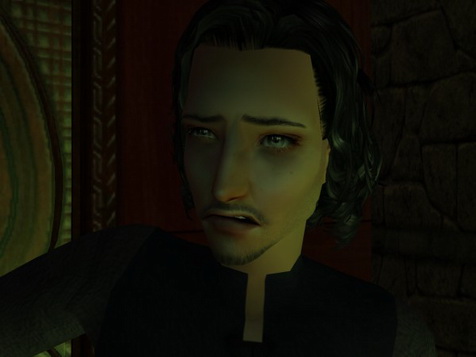
Aelfden grabbed the edge of the desk to haul himself unsteadily to his feet. As thin and light as his body was, his arms were equally weak.
“No? Where were you?” he challenged. “With an old friend?”
“We were with Father Brandt, who is old and my friend, if it is what you mean by ‘old friend’.”
“Not your young friend Cian, perchance?”
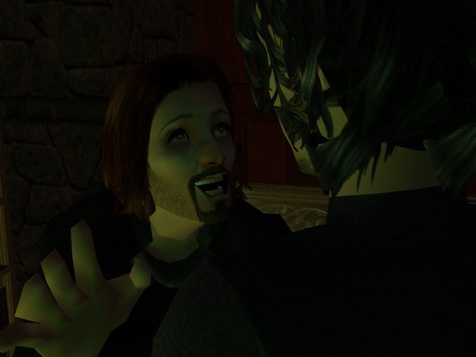
Araphel gasped painfully before choking out, “No! You may ask Father Brandt himself! We had a roast of chicken and a long chat. Ask him!”
He was beginning to understand – not what was happening, but at least what grave danger he was in. Sebastien’s heart was stabbing with pain, but he scarcely cared: this was a danger that would outlast even this body.
“You must have missed him!” Aelfden grinned maliciously. “He was here last night and took his bride away with him! Whither we know not where, but we are sorely afraid.” He began poking Sebastien painfully in the ribs with every third or fourth word. “Sorely afraid! For he is the Demon Eight! We know him now!”
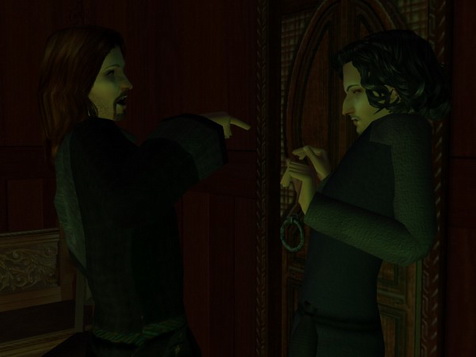
Sebastien squealed like a goat, though fortunately he had at least the excuse of the jabbing finger.
“And who are you, Sebastien?” the priest snarled. “I have been trying to determine! Who are you? Five, Six, Seven?”
He stopped poking long enough to cross himself, and Araphel took the occasion to cry, “I am called Sebastien! Father!”
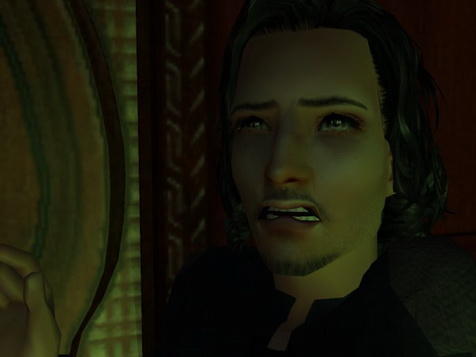
“Khamsha? Shetta?” He shoved Araphel against the wall with both hands and howled, “Shaba?”
Araphel wailed, “Father!”
Those familiar, everyday words on the Abbot’s tongue were made frightening. Aelfden might have remembered shaba, but the others… and the alphabet… Perhaps the man knew more than anyone realized.
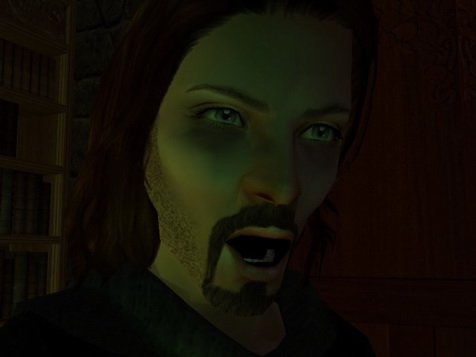
Aelfden shoved him again and shouted, “Vade retro!”
Araphel bleated, “Mon père! Mon père!” as much out of his own fear as Sebastien’s. “Je ne suis qu’un homme! I am only a man! Look!”
He kissed his fingertips and leapt up onto the chest to lay them against the breast of the wooden Christ hung high on the wall.
“Look!”
He leapt down again and fumbled over the priest’s robes until he found his heavy crucifix and drew it out to kiss it.
“Does a demon do this?” he pleaded. He crossed himself and asked, “Does a demon celebrate Mass? Does a demon dare receive the body of the Lord?”
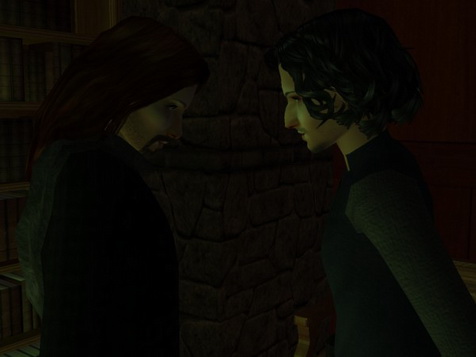
Aelfden sobbed in despair and lifted an arm as if he meant to make the sign of the Cross over one or both of them, but it shook violently, and he let it fall.
Araphel picked it up and kissed the trembling hand, thankful that Aelfden could not notice how his own was shaking.
“What a nonsense, Father,” he whispered through a taut smile. “Father Timothy said you were unwell this morning, and now I see, you are too entirely tired. Let us straighten up this mess and go down to sit in the parlor a while, where it is warm.”
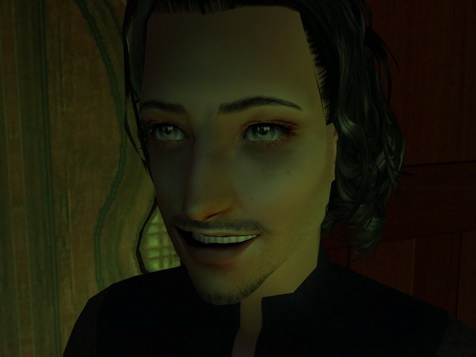
“Oh, Lord, what have I done?” Aelfden moaned.
“Perhaps He knows, but I do not,” Araphel laughed weakly. “What did you do?”
He glanced down at the ominous page again, hoping desperately that the Abbot had not been attempting to summon a demon, as he had claimed. Araphel did not know how it could be done, but he feared Aelfden might.
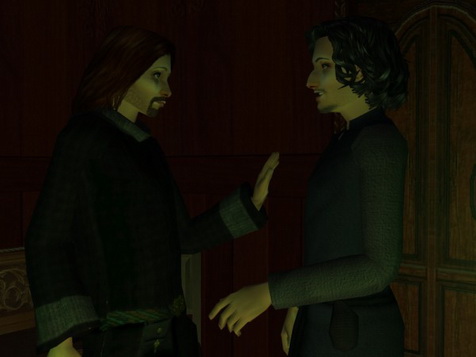
“I…” the priest began. His lower lip hung limp as a pouting child’s, but the sorrow of his haggard face was real. “Flann said you… said…”
Such miserable, mumbled words hardly seemed capable of cruelty, but the name alone shot Araphel through with pain, slicing him from head to heel like a knife bent on skinning the flesh from his bones while he still lived. He did not yet know what the Abbot had done, but he already felt an agony that would outlast this body.
When Aelfden spoke no further, Araphel hissed through his teeth, “What about Flann?”

Aelfden seemed to rouse himself with a few last sparks of anger cast off by a fire now smothered.
“Over here!”
He led Araphel to the one book he had not pulled onto the floor with him: the great parish register of births and deaths and weddings.
“Remember this?” He jabbed a bony finger at the darkly-lettered name of Cian, low on the leftmost page.
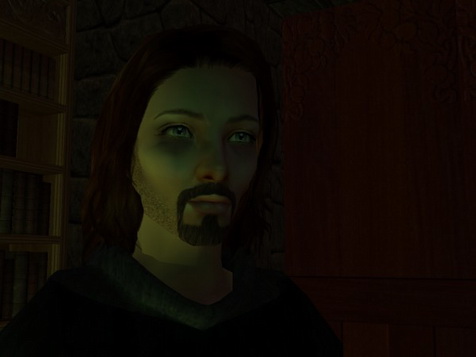
Araphel remembered. Dantalion had signed his own pretended name and added a cross for good measure – or for a joke, perhaps. He had also written Eithne’s, but more lightly, as if even her name was to be treated gently. The little girl had then carefully inscribed a cross beside it, with the furrowed brow and awkward hand of those ancient men who had first copied Ramiel’s ox heads and tent poles – and even his crosses, though those Ramiel had intended only for harmless crossed sticks. It would take men – perhaps at the suggestion of Dantalion and his kind – to invent crucifixion.

“And on the facing page!” Aelfden poked his finger at the bottom of the other page. “I had to write small to fit it in, but it shall stand in opposition to your cruel prank forevermore!”
Araphel shoved him aside and bent to look, though at the same time his gray eyes went wide as if to focus on something far away. Blurrily he read:
PRID NON DEC in sanct matrim Osh & Flann filia Flann & Maelmuire
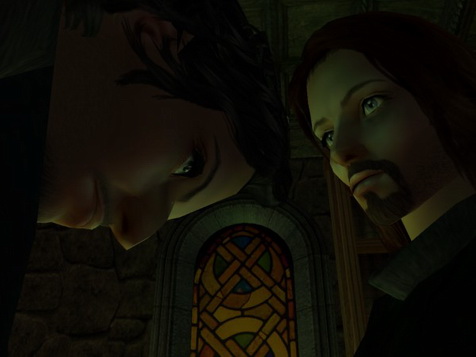
It was written small and much abbreviated, and even before he quite understood what he was reading, his eyes were wet with helpless tears. He truly saw only the middlemost words: Osh and Flann separated forevermore by nothing more than an ampersand. In his heart he cursed his brother for ever having taught the men to write.
He slammed his fist down on the page in fury, and in anguish he moaned, “Why?”
Aelfden did not seem to have an answer. His mouth was ugly with defiance, but his eyes were fearful.
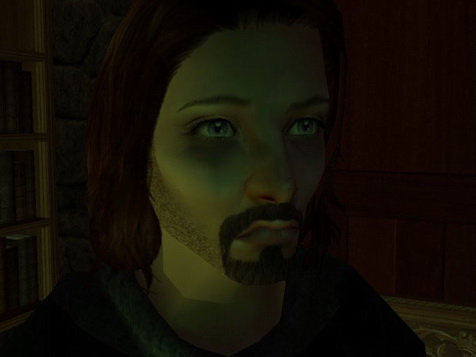
Araphel did not care. He shoved the priest against the bookshelf, frail-bodied though he was.
“Why?” he demanded. “Why?”
“She saw a demon,” Aelfden whispered through shivering teeth. “They came in the night…”
“No!”
Araphel kicked the ominous book against the leg of the table, knocking it closed over its ancient alphabet.
“What did you tell when she wants to marry me?” he sobbed. “Just because you are a priest, you do not have to marry any man and woman who come in the night! So!”

“That was different – ”
“No! It is the same!”
Araphel kicked the pages of the manuscript into a flurry of lamb-white, red-stained sheets. He no longer cared.
“You give her time to change her mind for me, but not for him! It is to spite me you did this!”
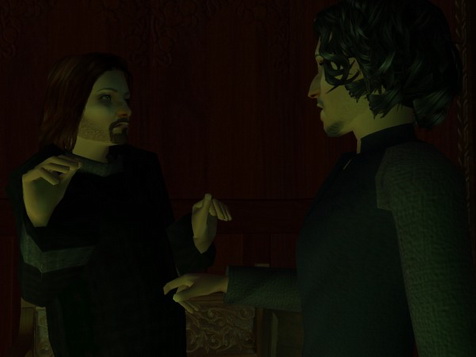
“Nonsense!” the Abbot whispered hoarsely. “Absurd!”
“Then what is this?” Araphel shoved the register across the desk and against the wall. “If you are not thinking of me, you turn the next page to have space to write! Even when you are writing this you are thinking how you will show this to me! You do this to hurt me! You marry her to this predator elf to have your revenge on me!”
“She would never have married you in any case,” Aelfden muttered limply.
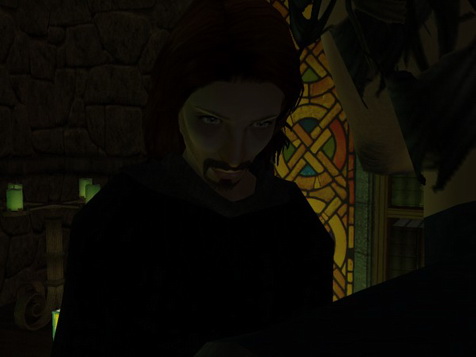
“She would! I only give her time – to find peace in her mind before she decides – as I trusted you to give her! And you saw her weakness, and you did not help her then – you trapped her!”
Aelfden gasped as if he had been shoved again, but Araphel had already shoved or kicked everything movable in the room, and he did not intend to make another round. There remained only the door to slam behind him.
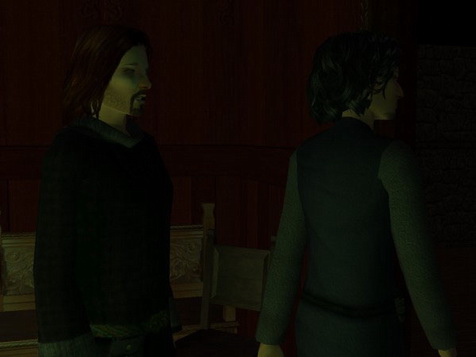








Poor guy... Really Lothere, I'm still on team Araphel here, even though some damage seems to be done. I'm a sucker for tragic romaces.